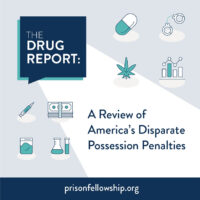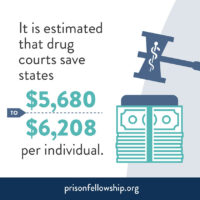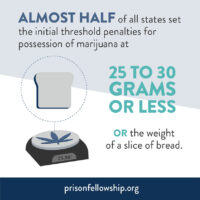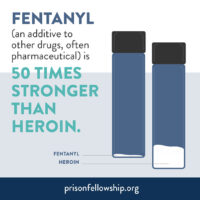THE DRUG REPORT
A REVIEW OF AMERICA'S DISPARATE POSSESSION PENALTIES
The Drug Report: A Review of America's Disparate Possession Penalties was prepared by the criminal justice experts at Prison Fellowship®, a leading advocate for justice that restores. The report analyzes the variation in penalties for possession of marijuana, heroin, cocaine, and fentanyl under state and federal laws. Detailed case studies for each drug demonstrate disparities in how each drug is categorized and penalized. The report features ways that some states are creatively responding to drug possession through alternatives to incarceration.
Did you know that penalties for drug possession are different from state to state and at the federal level? The Drug Report reveals wide discrepancies for the same general possession offenses across jurisdictions and makes suggestions for how to fix the problem.
KEY TAKEAWAY
U.S. lawmakers have spent decades ratcheting up the severity of punishments for possession of illegal drugs, yet drug possession remains widespread. That's why Prison Fellowship prepared The Drug Report, which examines penalties across state and federal jurisdictions for possession of marijuana, heroin, cocaine, and fentanyl. Based on our findings, we are calling for a restorative approach that prevents the misuse of drugs, breaks the cycle of addiction, and invests in consistent accountability that is inclusive of treatment and rehabilitation.
REPORT HIGHLIGHTS
- In 2018, there were more than 1.5 million arrests for drug law violations, and more than 86% of them were for possession.
- Possession of marijuana: Almost half of U.S. states set the initial threshold penalties for possession of marijuana at 25 to 30 grams or less—the weight of a slice of bread. Ten states have now legalized marijuana, and several others have made it a civil offense.
- Possession of heroin: By 2016, one person in the U.S. was dying from an opioid overdose every 16 minutes. States responded with increased penalties, so possession of heroin is typically penalized as a felony.
- Possession of heroin: By 2016, one person in the U.S. was dying from an opioid overdose every 16 minutes. States responded with increased penalties, so possession of heroin is typically penalized as a felony.
- Possession of cocaine: Despite being in separate schedules, heroin and cocaine users receive the same penalties in many states. Penalties for cocaine possession range from a gross misdemeanor to a Class 1 felony.
- Fentanyl is 50 times stronger than heroin. In recent years, it has been used as an additive in other drugs. Because this practice is relatively new, very few states have established penalties for possessing fentanyl.
KEY STATS
- Government sources estimate that drug courts save states $5,680 to $6,208 per individual.
- In 2018, there were 1.5 million arrests made for drug law violations, and more than 86% of them were for possession.
- Almost half of all states set the initial threshold for penalties for marijuana possession at 25–30 grams—the weight of a slice of bread.
- By 2016, one person in the U.S. was dying from an opioid overdose every 16 minutes.
#HASHTAGS
#TheDrugReport
#JusticeByGeography
DOWNLOAD THE DRUG REPORT





